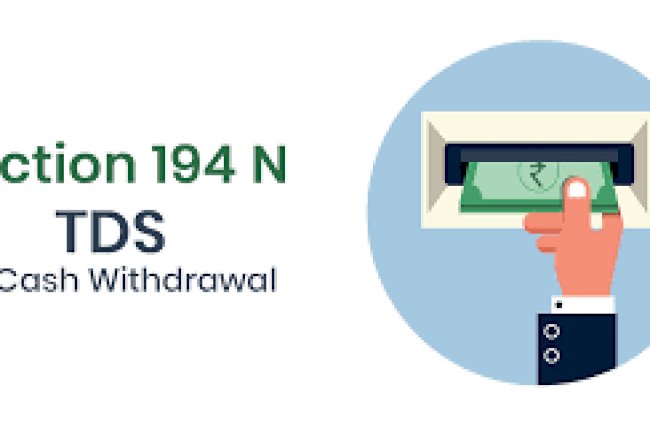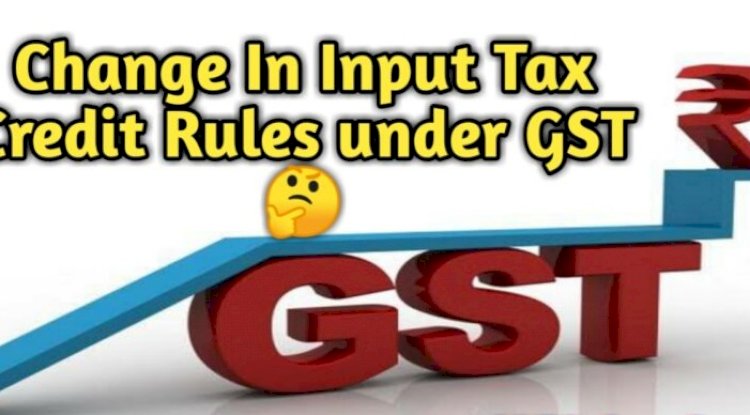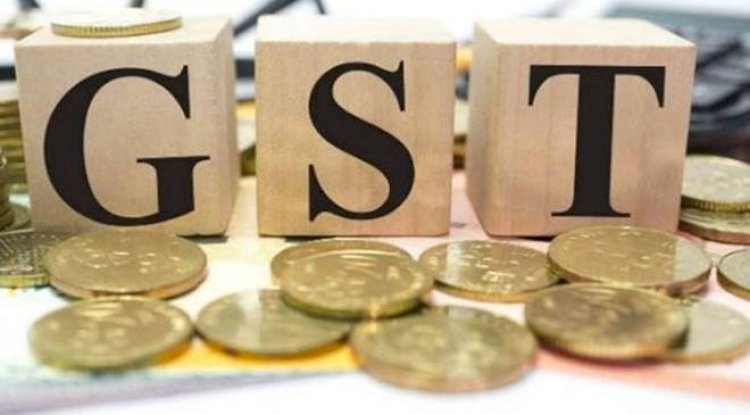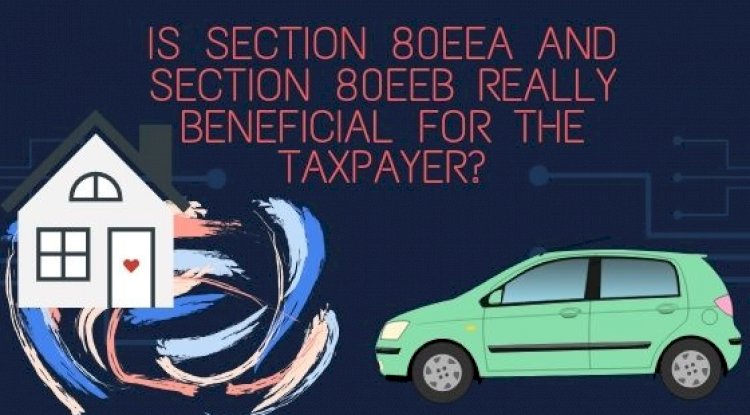Income Tax Return And GST Compliance For Doctors And Physicians
Income Tax Return And GST Compliance For Doctors And Physicians
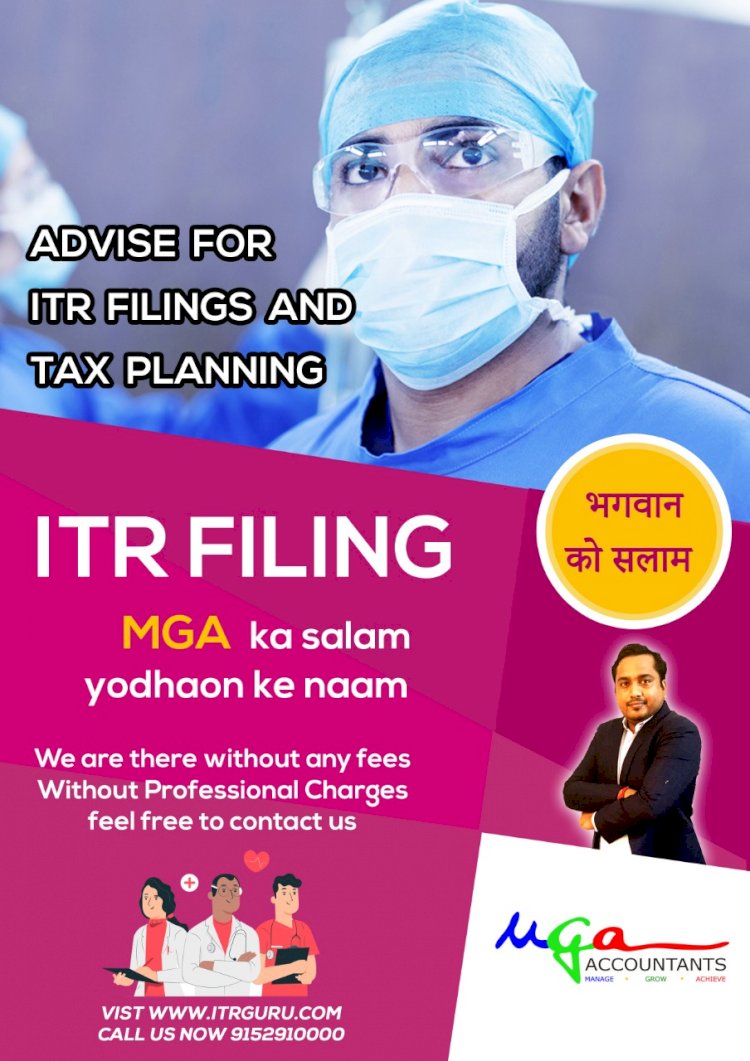
Doctors have some of the most important jobs in the world and also the most restless & vibrant. Most doctors do not have time to sit down and have lunch let alone worry about planning their income taxes. Physicians are also some of the highest paid professionals in the country. Doing your taxes can become more complex the higher your income is. This means, if you do not plan ahead of time, things can get really tricky.
If you are a physician who does not have time to be bothered with taxes, here are some helpful planning tips that might make you reconsider.
INCOME TAX
One of the most important factor to remember is that documentation is everything. In order to get the most out of your tax return, you must keep all of your records and receipt so that everything is accurate.
- A little tax planning can help doctors plan their finances in a better way, ensuring they make use of all tax-benefits and rebates specific to their profession
- It is mandatory for doctors, who earn more than Rs. 1.5 lakh per annum, to maintain accounts books for taxation purposes
Professionals are often so busy with their schedule that they do not have time to keep a check on the tax-benefits that they can avail. A doctor is one of the busiest professionals and thus has little time to learn about the latest tax law. However, regardless of one’s profession, it is crucial for everyone to learn the nuisances of tax planning.
Here are some necessary documentation and legal requirements for the doctors in India to avail tax benefits:

Income Tax:-
Section 44AA read with Rule 6F:
Under Section 44AA, it is mandatory for the medical professionals to maintain the books of accounts for Income Tax purpose.
Books required to maintain for the doctors whose Gross Receipt/Collection exceed Rs 1.50 Lakhs per annum:
- Cash Book, Journal and Ledger
- Carbon copies of bills exceeding Rs. 25 (either machine numbered or serially numbered)
In respect of expenditure incurred by the person, original Bills issued to the person and receipts. Where such bills and receipts are not issued and the expenditure is not more than Rs. 50, payment voucher prepared and signed by the person.
Other than the books of accounts a medical professional should keep and maintain the following documents:
- A daily case register in Form No. 3C
- An inventory as on the first and the last day of the previous year, of the stock of medicines, drugs etc. used for the purpose of his profession.
The books of accounts and the other documents specified in sub-rule (2) and sub-rule (3) should be maintained for the period of eight years from the end of relevant assessment year.
Under Section 271A of Income Tax, penalty for non-maintenance of records or the books of accounts is Rs. 25,000.
Audit 44AB
A Practicing doctor whose receipts are more than Rs. 50,00,000 lakhs during the previous financial year should audit his books of accounts by Chartered Accountant in practice. Or basically when your total income is taxable and profits are less than 50% of gross receipts.
Under Section-271 B of Income Tax Act, penalty for non-complying with tax audit is Rs. 1, 50,000 or 1/2% of gross receipt whichever is lower.
Due Date:-
a) Non Audit Case: 31st July of the year
b) Audit Case: 30th September of the year
Presumptive Tax scheme for professionals:
In presumptive taxation your income is presumed. Actual profit is not calculated. You can assume your profits to be 50% of your receipts. Only those who have annual receipts of Rs. 50 Lakhs or less can opt for this scheme. Presumptive Tax scheme for doctors has been introduced effective in FY 2016-17. As per Income Tax Act, Individuals and HUF who are resident of India can opt for this scheme if they are incorporated as a company, profits cannot be presumptive.
Benefits of Presumptive Tax Scheme:
- It will reduce the burden for small professional as they do not have to maintain the books under Section 44AA and no tax audit required.
- It will bring parity between small professional and businessmen.
GST
“Health care Services by a Clinical Establishment or Authorized Medical Practitioner or Para medics are exempt from Goods and services tax”
For understanding the exemption, we need to understand below important terms used in the said notification. These terms are also defined/clarified in the explanations given in the notification as:
1. Health care services
2. Clinical establishment
3. Authorized Medical Practitioner
4. Paramedics
1. Health care services
The said notification defines Health Care services as any service by way of
- diagnosis or treatment or care for
> illness,
> injury,
> deformity,
> abnormality or
> pregnancy
- in any recognized system of medicines in India and
- includes services by way of transportation of the patient to and from a clinical establishment,
- but does not include
> hair transplant or
> cosmetic or
> plastic surgery,
> except when undertaken to restore or to reconstruct anatomy or functions of body affected due to congenital defects, developmental abnormalities, injury or trauma.
Thus, all treatments excluding cosmetic treatments have been covered by this definition.
As per Oxford Dictionary, Health Care means the maintenance and improvement of physical and mental Health, especially through the provision of medical services.
2. Clinical establishment
As per the said notification, meaning of clinical establishment is: –
Clinical establishment means
- a hospital, nursing home, clinic, sanatorium or any other institution by, whatever name called,
> that offers services or facilities requiring diagnosis or treatment or care for illness, injury, deformity, abnormality or pregnancy
> in any recognized system of medicines in India,
- or a place established as an independent entity or a part of an establishment to carry out diagnostic or investigative services of diseases;
Section 2(e) of the Clinical Establishments (Registration and Regulation) Rules, 2010 defines clinical establishment as:
(i) a hospital, maternity home, nursing home, dispensary, clinic, sanatorium or an institution by whatever name called that offers services, facilities requiring diagnosis, treatment or care for illness, injury, deformity, abnormality or pregnancy in any recognized system of medicine established and administered or maintained by any person or body of persons, whether incorporated or not; or
(ii) a place established as an independent entity or part of an establishment referred to in sub clause (i), in connection with the diagnosis or treatment of diseases where pathological, bacteriological, genetic, radio logical, chemical, biological investigations or other diagnostic or Investigative services with the aid of laboratory or other medical equipment, are usually carried on, established and administered or maintained by any person or body of persons, whether Incorporated or not, and shall include a clinical establishment owned, controlled or managed by the :
- The Government or a department of the Government;
- A trust, whether public or private;
- A corporation (including a society) registered under a Central, Provincial or State Act, whether or not owned by the Government;
- A local authority; and
- A single doctor,
But does not include the clinical establishments owned, controlled or managed by the Armed Forces constituted under the Army Act, 1950, the Air Force Act, 1950 and the Navy Act, 1957.
Meaning of various categories of Clinical Establishment as used in the above definition
♦ Hospital: As per WHO, hospital means – Health care institutions that have an organized medical and other professional staff, and inpatient facilities, and deliver medical, nursing and related services 24 X 7 hours. Hospitals offer a varying range of acute, convalescent and terminal care using diagnostic and curative services in response to acute and chronic conditions arising from diseases as well as injuries and genetic anomalies.
♦ Maternity Home:Means any premises used or intended to be used for reception of pregnant women or of women in labour or immediately after child birth
♦ Nursing home: Means any premises used or intended to be used for reception of persons suffering from any sickness, injury or infirmity and providing of treatment and nursing for them and include a maternity home. A nursing home is a small private establishment providing healthcare services with accommodation.
♦ Clinic: A medical facility run by a single or group of physicians or health practitioners smaller than a hospital. Clinics generally provide only outpatient services and can have an observation bed for short stay.
♦ Sanatorium: A sanatorium is an institution that provides medical treatment and rest, often in a healthy climate, for people who have been ill for a long time for chronic disease such as tuberculosis etc.
3. Authorized medical professional:
As per the said notification, authorized medical professional means: –
A Medical Practitioner registered with any of the councils of the recognized system of medicines established or recognized by law in India and includes a medical professional having the requisite qualification to practice in any recognized system of medicines in India as per any law for the time being in force. The definition of authorized medical professional brings out the following prerequisites:
- Practitioner should be registered with any medical council;
- Practitioner should have requisite qualification to practice;
- Such qualification should be of any system of medicine recognized in India.
Following systems of medicine are recognized in India:
(i) Allopathic
(ii) Ayurveda
(iii) Siddha,
(iv) Unani,
(v) Homeopathy
(vi) Yoga
(vii) Naturopathy
Accordingly, qualified doctors holding recognized degrees in any of the above systems are covered in this entry if they are registered with their respective medical councils.
To sum up, any person as an individual or as part of clinic or hospital giving any kind of medical treatment through a duly qualified doctor empaneled with a recognized medical council, excluding hair transplant or cosmetic surgery is exempted from payment of GST.
4. Paramedics: These are trained healthcare professionals such as nursing staff, physiotherapists, technicians, lab assistants etc. They are accountable for their services when provided independently and therefore exempt. Services by them in a clinical establishment would be in the capacity of employee and not provided in independent capacity and will thus be considered as services by such clinical establishment. Similarly, services of assisting an authorized medical professional would be considered as services by such authorized medical professional only.
Other Exemption under the above Notification No. 9/2017
> Services provided by veterinary doctors: (Entry No 48)
This entry exempts services in relation to health of animals and birds from GST. This entry does not have any prerequisite with regard to qualification, recognition or affiliation.
> Blood Banks: (Entry No 76)
Cord Blood Banks include other Blood Banks and thus the services provided by Cord/Other Blood Bank for preservation of stem cells or any other services for such preservation are covered in Entry No: 76 and are thus Exempt from GST.
> Ambulance Services: (Entry No 77)
Providing of ambulance services are also exempt from the ambit of GST.
> Medical Tests: (Entry No 77)
Medical Test (either done in own Clinical establishment or done in the separate clinical establishment setup specially for such test) are covered in Entry No 77 and are thus Exempt. any GST.
> Bio Medical Waste: (Entry No 78)
This entry excludes unconditionally, services provided by operators of the common bio-medical waste treatment facility to a clinical establishment by way of treatment or disposal of bio-medical waste or the processes incidental thereto. Thus, services provided to hospitals by way of treatment and disposal of bio medical waste is not taxable under GST under the strength of this entry
> Room rent for patient (Entry No 77 ) :
Rent charged for rooms for patients are not taxable under GST. However, if the hospital is renting space for a chemist shop or providing rooms on rent for care takers, then that would attract GST.
Sale of Medicines is Taxable:
Medicines are taxable under GST. Although most of the medicines are taxed at 5% under GST laws but few are also taxed at 12% and some at 18%. We need to identify the HSN of the medicines / consumables / injectables and implants to ascertain the rate of tax applicable to them. If medicines etc. are purchased for resale then ITC is available and sale would attract tax.
Tax ability of other Income of Doctors
We shall also discuss about the other income of doctors in addition to the income from the medical profession and also discuss about the necessity of the registration in GST.
The concept of aggregate turnover and registration:
A person (Under GST) is identified through his PAN. The need of taking registration arises when his aggregate turnover exceeds Rs 20 lakh per annum (Except in special category states where the limit is Rs 10 Lakh). The aggregate turnover means sum total of all outward supplies of goods or services or both made by a PAN entity anywhere in India. This includes all taxable, tax free and exempted supplies. A person whose total outward supplies is exempt or not taxable is not required to register. But where even a small part of services provided or goods sold are taxable, he is required to get registered. Also, registration is required to be taken in all states from where the business is carried out.
Example: A person having hospital in Delhi, Haryana and UP. He has shops also in these states which has been given on rent. His turnover from the hospital and rental income from the shops crosses the limit of Rs 20 lacs in a year. He has to take registration on these states as the threshold limit requiring registration has crossed.
Tax ability on Reverse Charge:
Any hospital, clinic or doctor required to be registered on account of its aggregate turnover containing any component of taxable supply will be covered under provisions of reverse charge. Reverse charge can broadly be classified in three categories. Specified services under section 9(3), Inward supply received from unregistered person of taxable goods or services or both under section 9(4) and certain imports. ITC on tax paid on reverse charge is available but subject to restrictions and negative list inbuilt in the act.
GST Rate for Medical, Hospital and Doctor Services
GST rate for goods and services is based on HSN/SAC code. GST rate for services fall under 5%, 12%, 18% or 28% slab. Majority of the medical, hospital and doctor services are exempt from GST. Health care services by a clinical establishment, an authorized medical practitioner or para-medics is exempt from GST. Services by a veterinary clinic in relation to health care of animals or birds is also exempt from GST. Some of the above services not rendered by a clinical establishment or an authorized medical practitioner or a para-medics could be subject to GST.
IMA (INDIAN INSTITUTE OF MEDICAL ASSOCIATION)
The Indian Medical Association (IMA), which has 2.7 lakh doctors under its fold, has urged the government to exempt healthcare services offered by PRIVATE HOSPITALS from the Goods and Services Tax (GST).
IMA stated that exemption of GST to private sector shall result in several benefits which will include no increase in cost of healthcare being provided by the private sector, affordable healthcare services in India, eradication of any possibility of dis-incentivising future investments in the sector, among others.
FAQS:
Is GST leviable in following cases:
(1) Hospitals hire senior doctors/consultants/ technicians independently, without any contract of such persons with the patient; and pay them consultancy charges, without there being any employeremployee relationship. Will such consultancy charges be exempt from GST? Will revenue take a stand that they are providing services to hospitals and not to patients and hence must pay GST?
Answer: Health care services provided by a clinical establishment, an authorised medical practitioner or para-medics are exempt. [Sl.No. 74 of notification No. 12/2017-CT(Rate) dated 28.06.2017 as amended refers].
(1) Services provided by senior doctors/consultants/ technicians hired by the hospitals, whether employees or not, are healthcare services which are exempt.
(2)Retention money: Hospitals charge the patients, say, Rs.10000/- and pay to the consultants/ technicians only Rs. 7500/- and keep the balance for providing ancillary services which include nursing care, infrastructure facilities, paramedic care, emergency services, checking of temperature, weight, blood pressure etc. Will GST be applicable on such money retained by the hospitals?
Answer: Healthcare services have been defined to mean any service by way ofdiagnosis or treatment or care for illness, injury, deformity, abnormality or pregnancy in any recognised system of medicines in India[para 2(zg) of notification No. 12/2017-CT(Rate)]. Therefore, hospitals also provide healthcare services. The entire amount charged by them from the patients including the retention money and the fee/payments made to the doctors etc., is towards the healthcare services provided by the hospitals to the patients and is exempt.
(3) Food supplied to the patients: Health care services provided by the clinical establishments will include food supplied to the patients; but such food may be prepared by the canteens run by the hospitals or may be outsourced by the Hospitals from outdoor caterers. When outsourced, there should be no ambiguity that the suppliers shall charge tax as applicable and hospital will get no ITC. If hospitals have their own canteens and prepare their own food; then no ITC will be available on inputs including capital goods and in turn if they supply food to the doctors and their staff; such supplies, even when not charged, may be subjected to GST.
Answer: Food supplied to the in-patients as advised by the doctor/nutritionists is a part of composite supply of healthcare and not separately taxable. Other supplies of food by a hospital to patients (not admitted) or their
attendants or visitors are taxable.
What's Your Reaction?








